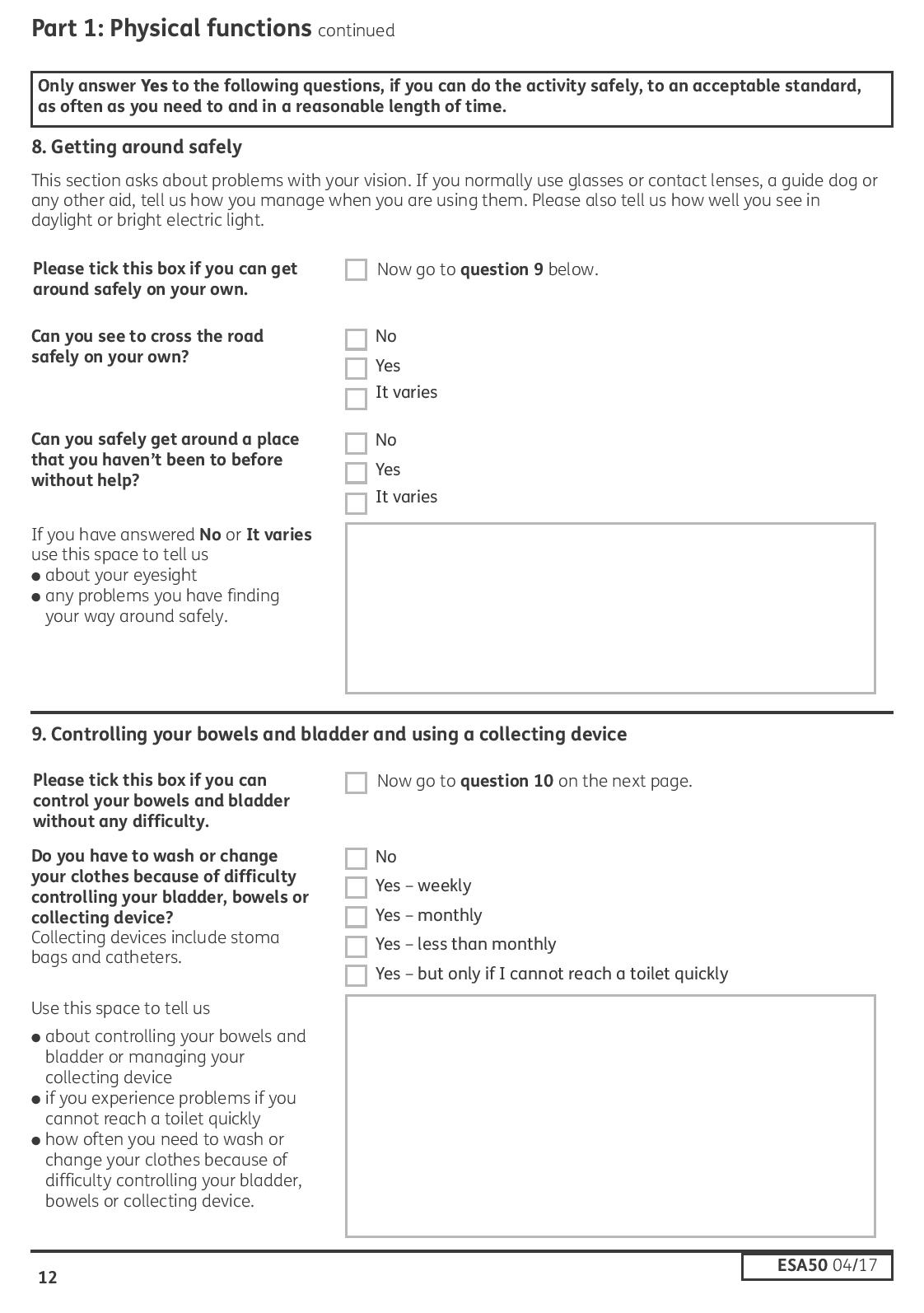Q8 - getting around safely
This advice applies to England. See advice for See advice for Northern Ireland, See advice for Scotland, See advice for Wales
This question is on page 12 of the form - see what it looks like

How to answer the question
Question 8 asks about problems with your vision.
If you have another physical condition that affects your ability to get around safely, you should include it - for example:
migraines - if they affect your vision or give you dizziness or vertigo
hearing loss - if it makes it more difficult for you to get around safely
narcolepsy (a disorder that makes people fall asleep at inappropriate times)
Meniere’s disease - if it makes you dizzy or gives you vertigo
If you normally use glasses or contact lenses, a guide dog, a hearing aid or any other aid, answer the questions based on how you get around when you're using them.
You don't need to write about your mental health in question 8 - this question is only about physical health conditions.
If you have a mental health condition that makes it hard for you to get around safely on your own (for example anxiety or agoraphobia), write about it in question 15.
"Can you see to cross the road on your own?"
No
Yes
It varies
Think about trying to cross a road you've never crossed before - for example, on the way to an appointment somewhere new.
Don't feel embarrassed if you have to tick "no", for example if you'd need help from another person.
You could tick "if varies" if it depends on the weather and if it's daytime or if it's after dark.
"Can you get around a place that you haven't been to before without help?"
No
Yes
It varies
Again, don't feel embarrassed if you have to tick "no" because you'd need help from another person - for example if:
you couldn't get around a new place without help after dark
you have blurred or double vision
your hearing difficulties mean you wouldn't be able to ask for help
What to write in the box
It's important you tell the DWP more by explaining your situation in the box - both for crossing the road and getting around new places.
It's important to explain things like:
what would stop you from crossing the road on your own
whether you've fallen in the past
if you have good and bad days (for example, if you have migraines) - and what it's like for you on different days
whether you can use public transport to get around - for example you can't see the number on the bus, so don't know if it's the right route
if you can get around a supermarket to find what you're looking for
if you can focus on things when you need to - for example road signs
Andrea says: "My eye condition is getting worse. I've started to get tunnel vision and it's difficult for me to see when it's getting dark, or if there are dim lights. I'm not used to it, and I'm getting clumsy because my peripheral vision is going. I've bumped into people in the street because I haven't seen them coming - it's really embarrassing.
Once it starts to get dark I can only cross the road with someone else or at a crossing because I can't see what's coming. I've had a couple of near misses when cars have had to emergency stop to not hit me."
How the DWP assess this question
The DWP look at a list of statements called 'descriptors'. They'll give you a number of points depending on which descriptor applies to you.
The DWP add together all the points you get from the whole form. This means you can qualify for ESA even if you don't get all the points for this question.
Descriptors for question 8
| Descriptors | Points |
|---|---|
|
Descriptors
8 (a) Unable to navigate around familiar surroundings, without being accompanied by another person, due to sensory impairment. |
Points
15 |
|
Descriptors
(b) Cannot safely complete a potentially hazardous task such as crossing the road, without being accompanied by another person, due to sensory impairment. |
Points
15 |
|
Descriptors
(c) Unable to navigate around unfamiliar surroundings, without being accompanied by another person, due to sensory impairment. |
Points
9 |
|
Descriptors
(d) None of the above apply. |
Points
0 |
Next steps
Question 9: Controlling your bowels and bladder and using a collecting device
Help us improve our website
Take 3 minutes to tell us if you found what you needed on our website. Your feedback will help us give millions of people the information they need.